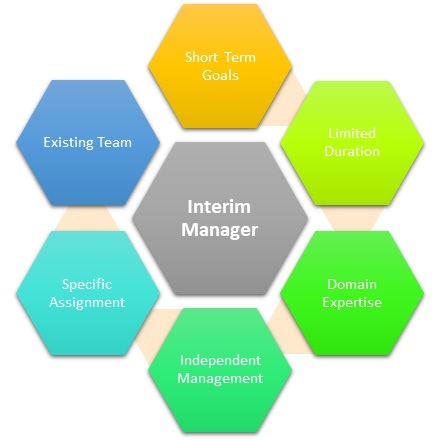- Business Concepts ›
- Human Resources (HR) ›
- Interim Manager
Interim Manager
Definition, Importance & Example
This article covers meaning & overview of Interim Manager from HRM perspective.
What is meant by Interim Manager?
Interim manager is a briefly appointed manager to manage the resources of an organization. An interim manager is appointed for either limited duration assignments or when the organization is undergoing a change. An interim manager is even kept when the project is important and it would be impossible to recruit a manager for the perpetual position at such a short notice.
Sometimes for some reasons a manager might have to leave a project in between, then an interim manager is appointed till the project is completed. An interim manager can be appointed from external sources if no suitable manager is found internally. Interim Managers are appointed to avoid chaos which might occur due to sudden changes in the organization, some changes might start politics in the organization which can harm the organization’s revenue generating abilities, brand value and employee productivity and moral.
Elements of an Interim Manager

1. Short Term Goals
2. Limited Duration
3. Domain Expertise
4. Independent Management
5. Specific Assignment
6. Existing Team
Importance of Interim Manager
Interim manager is very important for businesses when they have to manage a change or a crisis. An interim manager can be appointed within a matter of days, it might take a few weeks or months to find the right candidate for the permanent position. An interim manager can help to restore order in the organization and plug holes in the system that were made due to the earlier incumbent of the position leaving.
Interim managers if hired from external sources can bring in a fresh perspective into the organization and can help bring a fresh breathe of air into the organization which can help turning around the organization’s fortunes. Interim managers hired from external sources are usually well qualified and have a diverse experience which can be very useful for the organization.
If the manager is appointed from within the organization then it is easy to induct the manager into the position, the manager will be familiar with the system of the organization and will have internal knowledge about the organization, it is important to hire a manager with creative and practical thinking and also someone with a positive outlook to turn the fortunes of the organization around.
Difference Between Interim Manager & Permanent Manager
Permanent manager is a concept that is closely related to interim manager, a permanent manager takes time to appoint and is usually appointed at the beginning of the project.
An interim manager would replace a permanent manager in case the permanent manager leaves due to any reason. An interim manager is required to take up all the responsibilities that the permanent manager had.
Example of Interim Manager
In football managers resign or are sacked if the team is producing a string of poor results, there is a lack of cohesion in the team and many other such reasons due to which the stakeholders are not happy with the team’s performance.
If the manager resigns or is sacked in the middle of the season then an interim manager is appointed to handle the crisis, football teams usually have a deputy manager appointed at all times who will take over when the manager leaves the club, it is quite a common phenomenon in football that managers are forced or asked to leave mid-season and therefore these clubs have a contingency incase such an occurrence takes place. The club therefore usually prefers to appoint a manager that is within the organization and knows the philosophy of the club inside out.
Hence, this concludes the definition of Interim Manager along with its overview.
This article has been researched & authored by the Business Concepts Team which comprises of MBA students, management professionals, and industry experts. It has been reviewed & published by the MBA Skool Team. The content on MBA Skool has been created for educational & academic purpose only.
Browse the definition and meaning of more similar terms. The Management Dictionary covers over 1800 business concepts from 5 categories.
Continue Reading:
What is MBA Skool?About Us
MBA Skool is a Knowledge Resource for Management Students, Aspirants & Professionals.
Business Courses
Quizzes & Skills
Quizzes test your expertise in business and Skill tests evaluate your management traits
Related Content
All Business Sections
Write for Us